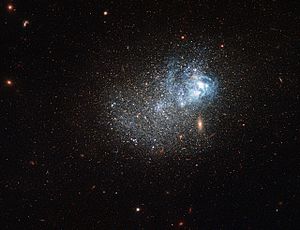I Zwicky 36 facts for kids
Quick facts for kids I Zw 36 |
|
|---|---|

Blue compact dwarf galaxy known as Markarian 209 taken by the Hubble Space Telescope
|
|
| Observation data (J2000 epoch) | |
| Constellation | Canes Venatici |
| Right ascension | 12h 26m 16.02s |
| Declination | +48° 29′ 36.6″ |
| Redshift | 0.000941 |
| Helio radial velocity | 282 km/s |
| Distance | 5.8 Mpc (19 Mly) |
| Type | Blue compact dwarf |
| Absolute magnitude (V) | −14.7 |
| Other designations | |
| Mrk 209, PG 1223+488, UGCA 281, Z 1223.9+4846, Anon 1223+48, PG 1223+487, UZC J122617.1+482938, [H56] 29, LEDA 40665, SBSG 1223+487, ZW I 36, MCG+08-23-035, TC 211 | |
| See also: Galaxy, List of galaxies | |
I Zwicky 36, or I Zw 36 for short, is a fascinating galaxy located in the constellation of Canes Venatici. This constellation is also known as the Hunting Dogs. I Zw 36 is quite far from our own Milky Way galaxy. It is about 5.8 megaparsecs away, which is roughly 19 million light-years.
Contents
What is I Zw 36?
I Zw 36 is a special type of galaxy. It is known as an irregular galaxy. This means it does not have a clear spiral or oval shape like many other galaxies. Instead, it looks a bit messy or unorganized.
A Blue Compact Dwarf Galaxy
More specifically, I Zw 36 is a blue compact dwarf galaxy. Let's break down what that means:
- Blue: This galaxy looks blue because it is full of very young, hot, and bright stars. These stars shine with a strong blue light.
- Compact: It means the galaxy is quite small in size. Dwarf galaxies are much smaller than giant galaxies like our Milky Way.
- Dwarf: This refers to its smaller size compared to larger galaxies.
Why So Many Young Stars?
Blue compact dwarf galaxies like I Zw 36 are known for making new stars very quickly. This process is called star formation. The stars in I Zw 36 are very young. Most of them are less than 3 million years old. To give you an idea, our Sun is about 4.6 billion years old!
A Galaxy Far From Others
I Zw 36 is quite a lonely galaxy. It is very isolated in space. The closest known galaxy to it is Messier 94 (also called NGC 4736). Messier 94 is about 1.4 megaparsecs away from I Zw 36. That's about 4.5 million light-years!
A Possible Past Collision
Scientists think that I Zw 36 might have had a collision or close encounter with another galaxy a long time ago. Even though it is isolated now, a past merger could explain why it is forming so many new stars so quickly. When galaxies collide, their gas and dust clouds can get squished together. This often triggers a burst of new star formation.
See also
 In Spanish: I Zw 36 para niños
In Spanish: I Zw 36 para niños
 | Jessica Watkins |
 | Robert Henry Lawrence Jr. |
 | Mae Jemison |
 | Sian Proctor |
 | Guion Bluford |

